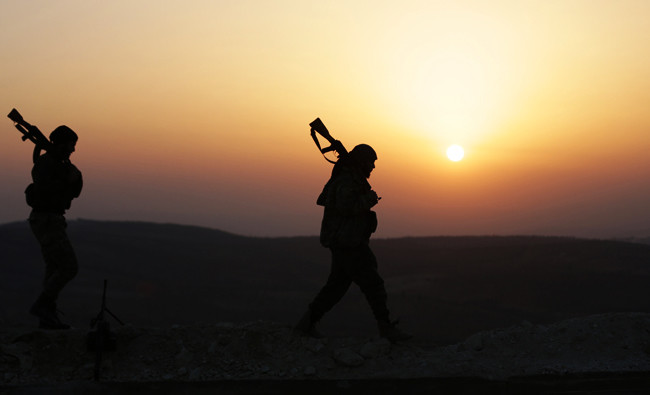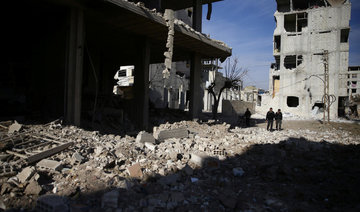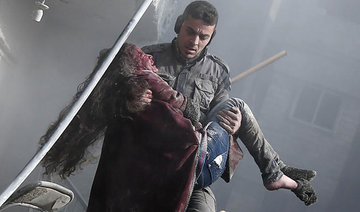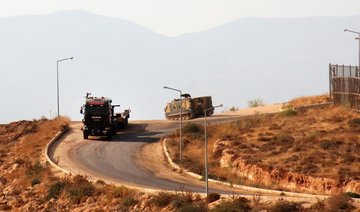ANKARA: A deadly attack carried out by Iranian militias on Turkish troops deep inside Syria has cast renewed doubt on the survival of a de-escalation agreement meant to ease tensions between three of the main powers enmeshed in the long-running conflict.
The assault on the outpost in Idlib province, southwest of Aleppo city, on Monday night killed one Turkish soldier and injured five others. The Turkish military retaliated with rocket fire, but experts have told Arab News that the bloodshed could be a sign of further trouble to come.
Last year officials from Ankara, Tehran and Moscow agreed to set up a series of de-escalation zones in Syria that were supposed to reduce violence between anti-government insurgents and forces fighting in support of Syrian President Bashar Assad.
The UN backed the move but all three countries remain deeply involved in the conflict and Monday night’s attack was just the latest indication that their detente is in danger of collapsing into a new wave of violence.
Huseyin Bagci, a professor of international relations at Ankara’s Middle East Technical University, said the deal — struck in Kazakhstan’s capital Astana — was “still valid” but “the three guarantor countries should immediately meet and discuss the ongoing problems with each other.”
He anticipated more clashes between Iran’s proxy forces and Turkish troops in the coming weeks, as both powers seek to exert their influence over Idlib — a province controlled by the former Al-Qaeda affiliate group Hayat Tahrir Al-Sham.
The outpost that was attacked on Monday had only been established that morning. It is the fourth observation point the Turkish military has set up in Idlib, with a further eight still due to be built under the terms of the Astana deal, but its construction came at a particularly delicate time.
On Jan. 20, the Turkish military launched Operation Olive Branch against Kurdish fighters belonging to militias including the People’s Protection Units (YPG) stationed in the nearby Syrian district of Afrin. Ankara has since portrayed the offensive as a successful attempt to root out separatists threatening its sovereignty but Damascus fears Turkish troops are moving deeper into Syrian territory in an attempt to establish a permanent presence in the country.
The Syrian civil war has turned into a battleground for regional and international powers since it first began with a wave of civil unrest against the Assad regime in 2011. The regime responded to the peaceful protests in brutal fashion, arresting and killing thousands of its opponents and deliberately stoking the flames of an Islamist insurgency.
Under the guise of fighting terrorism and protecting one of its main allies, Iran has become increasingly involved in the war. There was further evidence of this close relationship after Monday night’s attack, with the Syrian army yesterday (Tuesday) deploying anti-aircraft missiles to the front lines in Aleppo and Idlib in an apparent warning to Ankara not to retaliate further.
Tehran has also urged Turkey to stop its military offensive against the Kurdish separatists, accusing it of breaching Syrian sovereignty and destabilizing the region.
Meanwhile, Russia still finds itself mired in the conflict almost three years after first launching airstrikes against opposition groups fighting the Assad regime. Last Saturday, one of its pilots blew himself up with a grenade to avoid being captured by insurgents after his plane was shot down over Idlib.
Timur Akhmetov, a researcher at the Moscow-backed Russian International Affairs Council, told Arab News that the latest clash between Turkey and Iranian-sponsored militias might yet develop into a major new fault-line in the war.
“It would not be unrealistic to expect confrontation between Turkey-backed groups and pro-Assad forces in the coming days. The decisive factor, however, will be the absence of Russian air support in any offensives against Turkish interests,” he said.
Syria peace deal threatened as Iran and Turkey clash in Idlib
Syria peace deal threatened as Iran and Turkey clash in Idlib

Hope turns to regret among Syrians returning home from Turkiye

- More than 80,000 have gone back to Syria since Assad’s fall
- Those who returned in December lost right to re-enter Turkiye
ALEPPO: Ahmed Al-Sheikh’s excitement at returning to his homeland from neighboring Turkiye after the fall of Bashar Assad has turned to bitter disappointment at the grim living conditions in Syria after some 13 years of war.
Sheikh is one of 35,000 Syrians who left Turkiye for Syria full of hope in the first three weeks after Assad was toppled on Dec. 8, giving up the right to come back to Turkiye after signing a voluntary return document.
Turkiye’s refugee association says many, like him, are now disillusioned by the reality of life in a war-ravaged country.
“I was shocked by the catastrophic situation, which was beyond my expectations,” said Sheikh, 35, speaking in his home after returning to Aleppo, eight years after he fled to Turkiye. He said that water and electricity are frequently cut off and Internet communication is almost non-existent.
Migrant returns are a key element of burgeoning ties between Syria and NATO-member Turkiye, which is emerging as a power broker able to wield influence economically and diplomatically. Syria’s transitional President Ahmed Al-Sharaa visited Ankara on Tuesday, discussing an expected rapid expansion of economic ties.
The presence of nearly 3 million Syrians in Turkiye has become a sensitive political issue. Many have faced bouts of anti-migrant sentiment that made them feel like unwanted guests, and some rushed to the border after rebels forced Assad out.
“Most of the refugees were initially excited about returning after the fall of the Assad regime, but this excitement faded over time,” said Kadri Gungorur, social welfare director of the Refugees Association in Turkiye, citing complaints such as the lack of education and health services.
“Some families feel regret and want to return,” he said. “When they compare the living conditions in Turkiye with Syria, we can accept that Turkiye offers them more opportunities.”
BID TO SUPPORT VOLUNTARY RETURNS
Sheikh was among those enthused by the rebels’ victory, dreaming of rebuilding his bombed Aleppo home. He vowed to go back as soon as Assad fell, despite friends’ efforts to dissuade him. Now he is dismayed by the comparatively poor living conditions and scarcity of job and education opportunities.
“I started thinking about returning to Turkiye because my life was stable there, and my children were in school. My living conditions were stable,” he said. “But I can’t go back now because I signed a voluntary return document.”
Due to such negative experiences, Turkish Interior Minister Ali Yerlikaya announced at the end of 2024 a scheme designed to enable migrants to better plan their return home.
The scheme entitles the heads of Syrian migrant families to visit Syria three times between January and June this year, according to an Interior Ministry document.
Between Assad’s fall and late January, 81,576 Syrians had entered Syria, indicating a slight fall in the daily rate of returns from December to some 1,600 a day, Yerlikaya said. It was unclear how many of those returning in January had signed the voluntary return document.
During a visit to Turkiye last week, the UN High Commissioner for Refugees Filippo Grandi expressed support for Turkiye’s refugee response and voluntary returns.
He praised the policy of what he called “go-and-see visits,” saying they were “a best practice, as it allows refugees to assess conditions for themselves and can pave the way for sustainable returns to Syria.”
’PERHAPS IN THE FUTURE’
Some Syrians are more inclined to wait and see.
Syrian chemist Jafer, 27, came to Turkiye 12 years ago and will not consider returning with his wife and three children until conditions improve.
“My children are currently well-adjusted in Turkiye, which makes staying here more likely since they have adapted to life, language, and education in Turkiye,” he said.
“Some people will return, but the lack of basic necessities prevents them from doing so. They think about returning, but not now, perhaps in the future.”
It is an option no longer open to Sheikh.
He was forced out of Aleppo in late 2016 when Assad forces, with the support of Russian air strikes, seized control of the eastern part of the city from rebels. He went on to build a stable life for his wife and four children in Turkiye.
He has opened a mobile phone repair shop in Aleppo, but his plan to fix his house there is on hold.
“I don’t know if the project will succeed here in the country or if it will fail. If it fails, I will have lost everything I earned during my time in Turkiye.”
Saudi Arabia says no to displacement of Gazans, rejects relations with Israel without Palestinian state

- The statement comes after President Trump hinted at US ownership of Gaza after Palestinians are displaced
- Trump insists Egypt and Jordan will have to take the displaced Gazans, with both states rejecting the idea
RIYADH: Saudi Arabia on Wednesday said its long-held position that Palestinians must have their own independent state was firm and not open to negotiation, a stance Crown Prince Mohammed bin Salman has reiterated many times before.
The Saudi Foreign Ministry statement came shortly after President Donald Trump said he wants the US to own the Gaza Strip after all Palestinians are displaced from there and sent to other countries, where settlements will be constructed for them.
The Kingdom’s position has been a longstanding one with its leaders repeatedly calling for justice for Palestinians, who they say deserve a state of their own alongside Israel as a way to find a lasting solution to the decades long conflict.
Saudi leaders have repeatedly said any formal relations between the Kingdom and Israel hinge on the creation of a viable Palestinian state on the 1967 borders.
The ministry statement highlighted a speech by the crown prince at the Shoura Council on September 18, 2024, where he stressed that Saudi Arabia will continue its tireless work toward the establishment of an independent Palestinian state with East Jerusalem as its capital, adding the Kingdom will not normalize ties with Israel without it.
The crown prince expressed a similar sentiment during the extraordinary Arab-Islamic summit in Riyadh on Nov. 11, 2024, where he stressed the continuation of efforts to establish a Palestinian state and demanded an end to Israeli occupation of the Palestinian territories.
He also urged more countries to recognize the State of Palestine, stressing the importance of mobilizing the international community to support the rights of Palestinians, which were expressed in the resolutions of the UN General Assembly by considering Palestine eligible for full membership of the world body.
“The Kingdom of Saudi Arabia also stresses its previously announced categorical rejection of any violation of the legitimate rights of the Palestinian people, whether through Israeli settlement policies, annexation of Palestinian territories, or attempts to displace the Palestinian people from their land,” the statement added.
Trump, standing next to Prime Minister Benjamin Netanyahu at the White House on Tuesday, said the Palestinians would be better off living outside of Gaza which has been bombed to rubble during Israel’s brutal 15-month attack.
“I don’t think people should be going back,” Trump said. “You can’t live in Gaza right now. I think we need another location. I think it should be a location that’s going to make people happy.”
The president insists Egypt and Jordan would have to take the Gazans he plans to displace. Both countries have rejected the idea outright.
Trump also did not rule out the use of American troops to help reconstruct the enclave and ensure the ownership of the territory, which he said could become the “Riviera of the Middle East,” given its temperate climate and prime location on the Mediterranean coast.
The Kingdom said that it’s the international community’s duty to work to alleviate the severe human suffering of the Palestinian people, who will remain in their land.
“Lasting and just peace cannot be achieved without the Palestinian people obtaining their legitimate rights in accordance with international legitimacy resolutions, and this is what was previously explained to the previous and current American administrations,” the ministry statement said.
Hamas ready for talks with Trump administration, Hamas official tells RIA

- Trump vowed on Tuesday that the US would take over the war-shattered Gaza Strip after Palestinians are resettled elsewhere and develop it economically, a move that would shatter decades of US policy toward the Israeli-Palestinian conflict
GAZA CITY: The Palestinian Hamas movement is ready to establish contact and hold talks with the administration of US President Donald Trump, Russia’s RIA state news agency cited a senior Hamas official as saying in remarks published early on Wednesday.
“We are ready for contact and talks with the Trump administration,” RIA cited senior Hamas Politburo member Mousa Abu Marzouk as saying.
“In the past, we did not object to contacts with the administration of (former US President Joe) Biden, Trump or any other US administration, and we are open to talks with all international parties.”
It was not clear when RIA interviewed Marzouk, who was visiting Moscow on Monday for talks with the Russian foreign ministry.
Trump vowed on Tuesday that the US would take over the war-shattered Gaza Strip after Palestinians are resettled elsewhere and develop it economically, a move that would shatter decades of US policy toward the Israeli-Palestinian conflict.
Marzouk told RIA that talks with the US have become a kind of necessity for Hamas, considering that Washington is a key player in the Middle East.
“That is why we welcomed the talks with the Americans and have no objection to this issue,” he added.
Iraq’s top court suspends new legislation that activists say undermines women’s rights

- Women’s rights advocates argue that the changes undermine previous reforms that created a unified family law and established safeguards for women
- Proponents of the amendments, which were advocated by primarily conservative Shiite lawmakers, defend them as a means to align the law with Islamic principles and reduce Western influence on Iraqi culture
BAGHDAD: Iraq’s top court suspended implementation Tuesday of three controversial bills passed last month by the country’s parliament, including a measure that activists said undermines women’s rights.
A number of members of parliament filed a complaint alleging that the voting process was illegal because all three bills — each supported by different blocs — were voted on last month together rather than each one being voted on separately. The Federal Supreme Court issued an order, a copy of which was obtained by The Associated Press, to suspend their implementation until the case is adjudicated.
The measures include an amendment to the country’s personal status law to give Islamic courts increased authority over family matters, including marriage, divorce and inheritance.
Women’s rights advocates argue that the changes undermine previous reforms that created a unified family law and established safeguards for women. Proponents of the amendments, which were advocated by primarily conservative Shiite lawmakers, defend them as a means to align the law with Islamic principles and reduce Western influence on Iraqi culture.
Earlier versions of the measure were seen as potentially opening the door to child marriage since some interpretations of Islamic law allow the marriage of girls in their early teens — or as young as 9. The final version passed by the parliament states that both parties must be “adults,” without specifying the age of adulthood.
The second bill was for a general amnesty law seen as benefiting Sunni detainees. Some fear it could allow the release of people involved in public corruption and embezzlement as well as militants who committed war crimes.
The third bill aimed to return lands confiscated from the Kurds under the rule of Saddam Hussein. It is opposed by some Arab groups, saying it could lead to the displacement of Arab residents.
Leaders ‘should respect’ wishes of Palestinians to stay in Gaza: Palestinian UN envoy

- For those who want to send them to a happy, nice place, let them go back to their original homes inside Israel, there are nice places there, and they will be happy to return to these places”
UNITED NATIONS, United States: World leaders and people should respect Palestinians’ desire to remain in Gaza, the Palestinian envoy to the United Nations said Tuesday, after US President Donald Trump said he believed people from the territory should be resettled elsewhere “permanently.”
“Our homeland is our homeland, if part of it is destroyed, the Gaza Strip, the Palestinian people selected the choice to return to it,” said Riyad Mansour. “And I think that leaders and people should respect the wishes of the Palestinian people.”
On Tuesday, Trump met with Israeli Prime Minister Benjamin Netanyahu at the White House, with the US leader saying he believed Palestinians should leave Gaza after an Israeli offensive that has devastated the territory and left most of it reduced to rubble.
Speaking ahead of the meeting, Trump said he wanted a solution that saw “a beautiful area to resettle people permanently in nice homes where they can be happy.”
At the United Nations, Mansour did not name Trump but appeared to reject the US president’s proposal.
“Our country and our home is” the Gaza Strip, “it’s part of Palestine,” he said. “We have no home. For those who want to send them to a happy, nice place, let them go back to their original homes inside Israel, there are nice places there, and they will be happy to return to these places.”
The war in Gaza erupted after Palestinian armed group Hamas’s October 7, 2023, attack, which resulted in the deaths of 1,210 people on the Israeli side, mostly civilians, according to an AFP tally based on official Israeli figures.
Israel’s retaliatory response has killed at least 47,518 people in Gaza, the majority civilians, according to the Hamas-run territory’s health ministry. The UN considers these figures as reliable.
The UN says more than 1.9 million people — or 90 percent of Gaza’s population — have been displaced by Israel’s offensive, with the bombing campaign having leveled most structures in the territory, including schools, hospitals and basic civil infrastructure.
The start of a ceasefire deal, which included the release of hostages held by Hamas and prisoners held by Israel, on January 19 saw Palestinians rejoice, with many returning to homes that no longer stood.
“In two days, in a span of a few hours, 400,000 Palestinians walking returned to the northern part of the Gaza Strip,” said UN envoy Mansour.
“I think that we should be respecting the selections and the wishes of the Palestinian people, and the Palestinian people at the end will make the determination, their determination.”




















